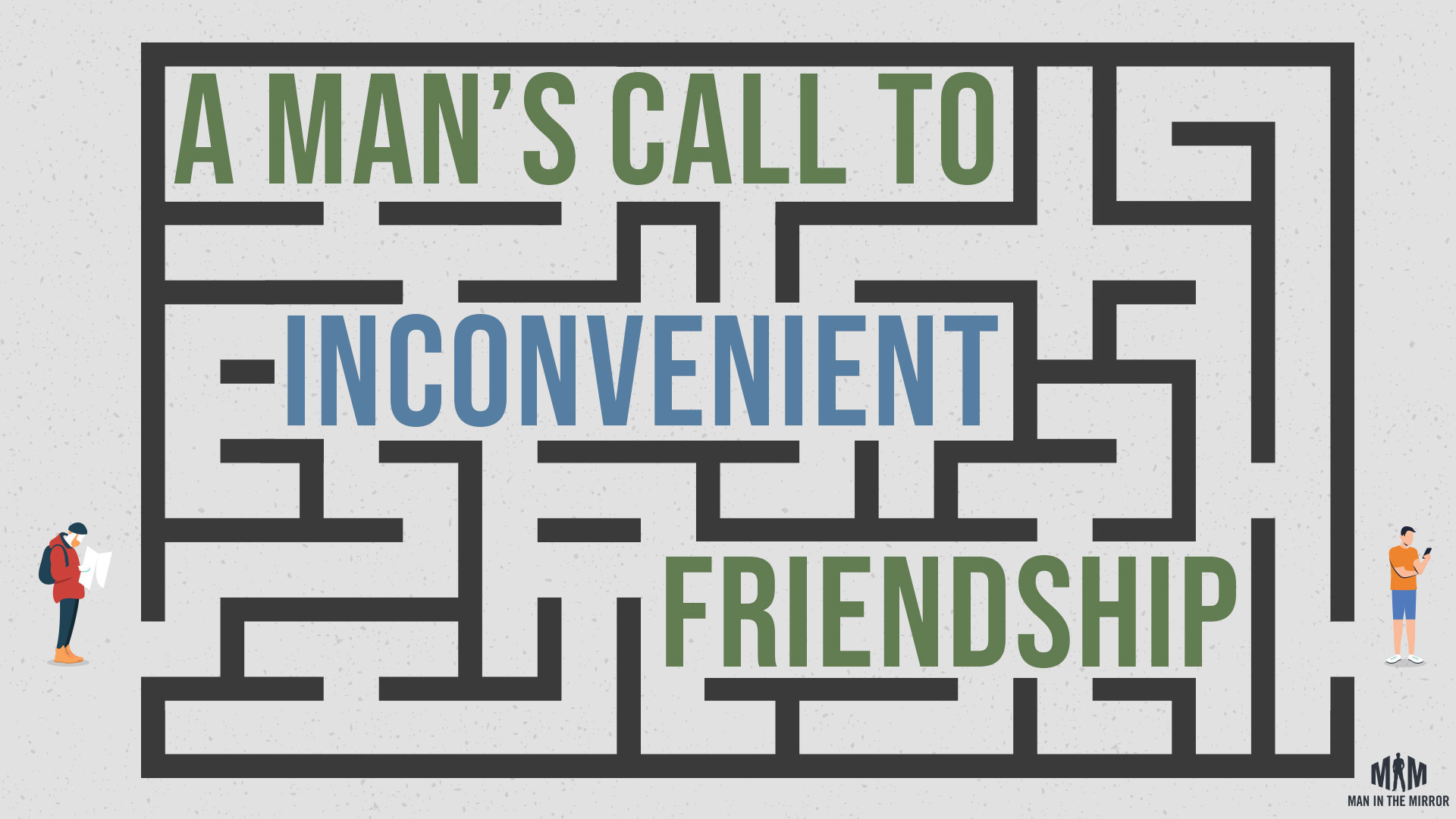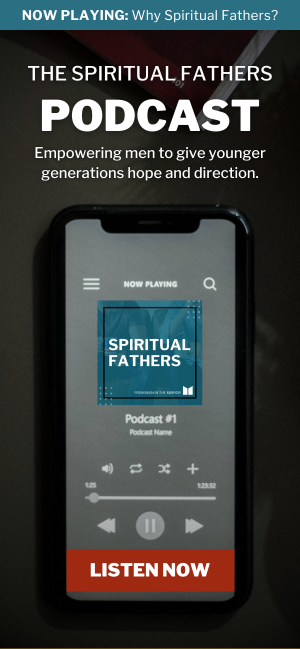Prison, Chains, and Heart Attacks: A Man’s Call to Inconvenient Friendship
While in chains, Paul wrote to Timothy about men turning their backs on him. But he also reminded him of the power of having a true friend in hard times. How do we leave fair-weather friendship behind, and why is it critical to our lives as disciples?

By Brett Clemmer
President & CEO
Casselberry, FL
Think back to a time in your life when you went through a crisis. Maybe it was a job loss, a painful breakup, the death of a loved one, or a scary medical diagnosis. Every one of us is acquainted with the fear and uncertainty that comes with it. It can be paralyzing.
When Paul writes the letter we call 2 Timothy, he is in chains and unsure of the future. He tells Timothy:
You are aware that all who are in Asia turned away from me, among whom are Phygelus and Hermogenes. May the Lord grant mercy to the household of Onesiphorus, for he often refreshed me and was not ashamed of my chains, but when he arrived in Rome he searched for me earnestly and found me. (1:15-17)
Over the past few weeks on the blog and at our weekly Bible study, we’ve been looking at Paul’s final advice to Timothy—the most important reminders he wanted to leave him with as he goes forward as a disciple maker to build the church.
When you first read 2 Timothy 1:15-17, it’s tempting to quickly skip over this part or ask, “Why are these verses even here?” It almost feels like an aside. But it’s far from it.
Rather than a theological teaching, Paul gives him an example-driven lesson, in essence saying: “Timothy, here’s a concrete example of what it looks like to be a faithful friend.”
It’s an example-driven lesson for us, too. When a brother faces a crisis, we face an opportunity.
False Friends Run, True Friends Bring Refreshment
“You are aware that all who are in Asia turned away from me…”
Paul had spent years in Asia (actually Asia Minor, what we now know as Turkey). He had deep roots in the church community there. In fact, Timothy is in Ephesus—in Asia Minor—reading this letter. How much more must it have stung then for him to recognize that so many had turned away from him?
But not everyone. Onesiphorus was “not afraid of [Paul’s] chains.” A faithful friend steps over the chains to sit with you in the mess.
When a brother faces a crisis, we face an opportunity.Click To TweetThe name Onesiphorus means “help bringer.” And that’s what he was. Onesiphorus showed up.
He didn’t just show up once, pat Paul on the back, tell him good luck, and then disappear. Paul says: “He often refreshed me” (emphasis added).
Think about the dark situation that Paul’s in—and yet, “He was not ashamed of my chains.” My predicament didn’t deter him. My mess didn’t cause him to turn away.
A lot of men find themselves in chains during a crisis. It may be the addict in your extended family, the aging neighbor who is beginning to lose track of things, the friend whose marriage is falling apart, the brother who can’t get out of bed after losing a child a year ago, or the colleague who’s being indicted for embezzling money.
The truth is that men in crisis are tough to be around. They’re messy. In their pain, they can be angry and prone to lashing out, or sad and pitiful. And sometimes the crisis is a mess of their own making, due to bad judgement or sin.
If we’re honest, we prefer to run with the winners. We don’t want to read books or watch movies about people who went through a crisis unless there is triumph on the other side. But in the real world—fallen and broken—our crises don’t always end in victory.
Do the chains deter you from being a help bringer? Are you ashamed of or inconvenienced by them? We can let our own quest for reputation, comfort, and enjoyment overshadow our responsibility to be a faithful friend.
But Onesiphorus didn’t. He knew Paul was in chains, but instead of turning away or avoiding him, he headed to Rome. He searched for him earnestly and didn’t give up until he found him.
What do men need when they’re going through a crisis? They need a help bringer—a friend who will show up and keep showing up.
My Onesiphorus (His Name Was Actually Dwayne)
Several years ago, I went to take my dad to a doctor’s appointment. As we walked down the hallway to leave, I realized my dad was no longer beside me. I looked back and he was holding onto a hallway chair rail with a death grip, stark white and sweating. Everything happened fast from there.
Men in crisis need a help bringer—a friend who will show up and keep showing up.Click To TweetAfter a quick ride to the ER and a helicopter flight to a larger hospital, I found myself sitting alone in the CCU waiting room. The doctor came out to tell me my dad had had a major heart attack, and they were preparing to do a quadruple bypass. “We’ll see what happens,” he said. I felt a mix of panic and dread.
As news spread, people began showing up from my parents’ small group. His faithful friends. I recognized some of them, but I didn’t really know them, so while they sat together, I sat on the periphery of the room by myself.
Until Onesiphorus, er—Dwayne—walked through the door. Dwayne wasn’t a close friend of mine. He was sort of a buddy I saw occasionally from church whose wife was friends with my wife. (I say most men in church make friends the old-fashioned way; they are the husbands of their wives’ friends!)
But Dwayne sat in that waiting room with me for eight hours that day. He talked when I wanted to talk, and he sat quietly with me when I didn’t. The gift of his presence was a great source of strength and comfort.
It was in that moment of crisis that I realized this man was a faithful friend—a brother willing to make sacrifices and show up when I needed it. Dwayne became one of my best friends. We walked together through different crises, large and small, in the years that followed. We often brought help to each other.
Refuse to Be a Fair-Weather Friend
Proverbs 20:6 says, “Many a man proclaims his own steadfast love, but a faithful man who can find?”
Faithfulness is rare, the writer suggests. But it’s invaluable to our friendships.
As Christian men, we’re not fair-weather friends. When the going gets tough in another man’s life, we step up—earnestly seeking him out to bring refreshment. Even when it’s inconvenient and uncomfortable. Especially when it’s inconvenient and uncomfortable.
What is your reputation among your friends? Are you the guy who only shows up when things are good? Are you the guy whom they know is always down for a party, or a day of fishing, an evening at the cigar shop, or to watch a game?
Or are you the guy your friends know they can come to for support when they’re struggling? Do they call you when the chips are down? Do they see you as not just a fair-weather friend but a help bringer?
As Christian men, we're not fair-weather friends.Click To TweetThe distinction is so important for our lives as disciples of Christ. Paul wasn’t going off on a tangent or getting distracted or putting in a quick sidenote to Timothy. Rather, Paul was going through the lessons and reminders that matter most.
The kind of friend we are relates directly to how we live out the gospel. It’s easy to read Paul’s description of Onesiphorus and see the gospel:
God seeks us out earnestly, even in our mess. Instead of bringing shame, He brings refreshment in Jesus. He’s not deterred by the things keeping us in chains, but rather, He brings the power to break them! And in the Holy Spirit, He sends us the ultimate help bringer.
We can apply Paul’s words to Timothy to our own lives, refusing to live as fair-weather friends. In this way, we will live out the gospel by bringing men, through our friendship, closer to the One who has the power to carry them through the crisis.
THE BIG IDEA: A faithful friend is determined to be present no matter the hardship or shame, and in doing so, he brings glory to God.
♦♦♦







